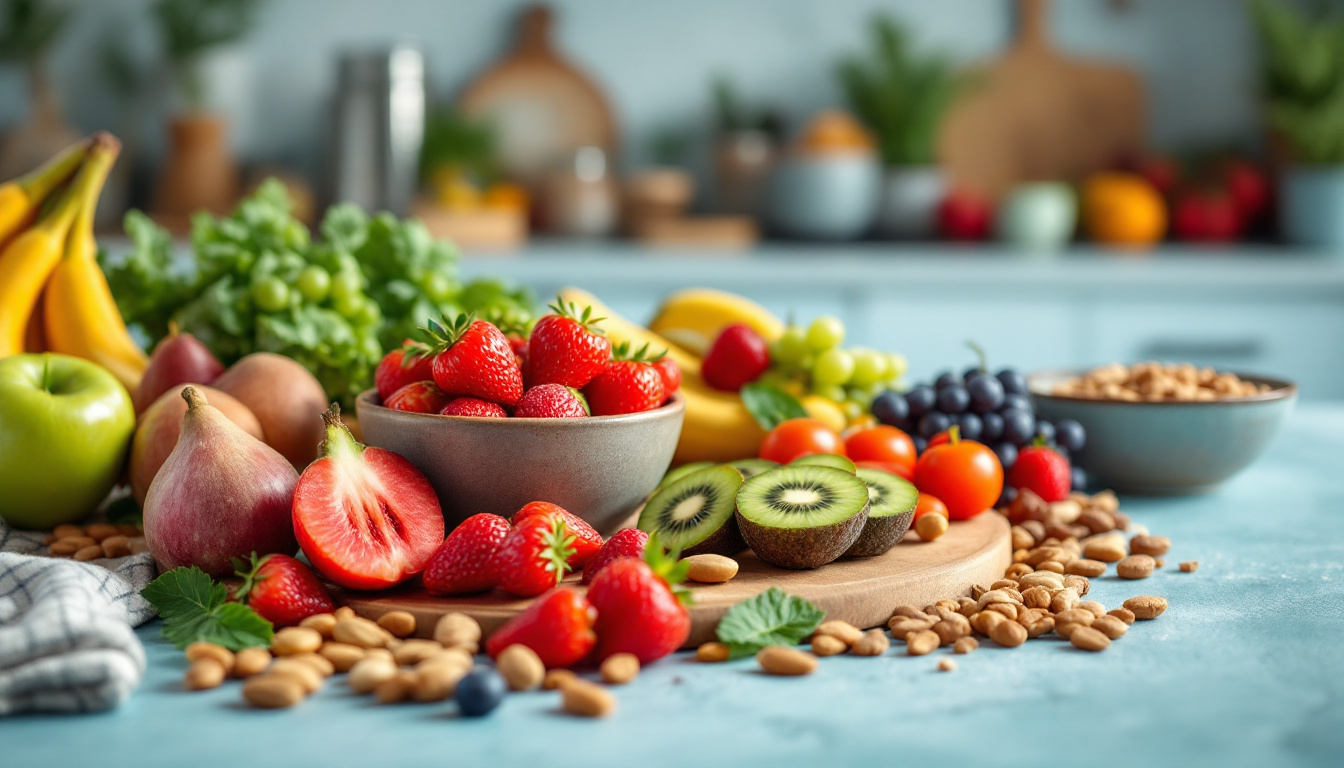Low-Calorie Snacks for Seniors
Smart Snacking Choices for Older Adults

Introduction
As we navigate through the golden years, maintaining energy levels and ensuring nutrient intake becomes vital. Snacking can be an effective way to achieve these nutritional needs if done correctly. This article explores low-calorie snack options that are not only suitable for seniors but also promote health and well-being. We will delve into nutritious recipes and tips to make snacking a beneficial part of a senior's diet.
Balanced, Low-Calorie Snack Ideas

What are some healthy low-calorie snacks suitable for seniors?
For seniors, selecting snacks that are both nutritious and low in calories is essential. Some excellent options include:
- Fresh Fruits: A cup of blueberries contains approximately 84 calories, making it a sweet and antioxidant-rich choice. One medium orange has about 72 calories, while a cup of sliced strawberries totals only 53 calories.
- Protein Boosts: Hard-boiled eggs offer around 78 calories and are rich in protein, beneficial for muscle maintenance. A stick of string cheese can provide 84 calories along with calcium.
- Raw Vegetables: Carrots, at about 50 calories per cup, can be enjoyed with low-fat dressing or hummus for added flavor and fiber.
- Whole Grains: Air-popped popcorn is a fantastic option; two 100-calorie bags deliver whole grains, fiber, and a satisfying crunch.
- Dairy Options: Nonfat Greek yogurt, with only 100 calories per cup, is packed with protein and calcium, supporting bone health.
Discuss nutritional benefits of snacks
Incorporating low-calorie snacks like the ones mentioned not only helps seniors maintain energy levels but also addresses nutritional needs effectively. These snacks are typically high in fiber, promoting fullness and helping manage weight without excessive calorie intake.
Additionally, including protein-rich snacks helps in muscle preservation and can stabilize blood sugar levels, particularly important for seniors prone to fluctuations. Making mindful choices around snack times and focusing on whole foods can enhance overall health, ensuring older adults meet their daily nutritional requirements and enjoy their snacks simultaneously.
| Snack Idea | Calories | Nutritional Benefit |
|---|---|---|
| Cup of Blueberries | 84 | High in antioxidants |
| Hard-Boiled Egg | 78 | High in protein |
| Air-Popped Popcorn (2 bags) | 100 | Whole grains, fiber |
| Nonfat Greek Yogurt | 100 | High in protein and calcium |
| Cup of Carrots | 50 | Fiber-rich, low-calorie |
Filling and Nutritious Snack Examples

What are some examples of low-calorie filling snacks for seniors?
Snacking can be a delightful way for seniors to meet their nutritional needs while enjoying satisfying treats. Here are a few filling low-calorie snacks to consider:
- Air-Popped Popcorn: Just 60 calories for two cups, this snack is not only light but also boasts a high fiber content, making it a go-to option for feeling full.
- Boiled Eggs: Each egg has about 70 calories and is packed with protein, making them a great choice for muscle retention.
- Watermelon: Hydrating and sweet, two cups of watermelon come in at around 90 calories, providing both satisfaction and refreshment.
- Baked Apples with Cinnamon: A warm treat, baked apples (95 calories) are a healthy dessert alternative that delight the taste buds without excess calories.
- Almonds: Just 98 calories for about 14 nuts, almonds are rich in healthy fats and protein, contributing to satiety and heart health.
- Pistachios: Another nutty option, pistachios offer about 80 calories for 20 nuts, making them a flavorful and nutritious snack.
- Celery with Peanut Butter: A classic combination, 2 teaspoons of peanut butter with celery aligns to just 68 calories and provides essential vitamins and healthy fats.
- Mixed Berries with Yogurt: Pairing low-sugar fruits like strawberries with plain yogurt delivers on taste and nutrition, essential for a balanced diet.
Highlighting Nutrient-Rich Options
These low-calorie snacks not only keep hunger at bay but also align well with a healthy eating pattern, providing key nutrients. Including whole foods such as fruits, vegetables, nuts, and dairy helps ensure adequate vitamin and mineral intake, promoting overall wellness in seniors. Incorporate these options into daily eating habits to support energy levels and maintain a healthy weight, all while enjoying a variety of flavors and textures.
High-Protein, Low-Calorie Snack Suggestions

Which low-calorie snacks are also high in protein for seniors?
Seniors looking to maintain their muscle health while managing calories can explore an array of nutritious snack options that are both protein-rich and low in calories.
- Cottage Cheese: A popular choice, half a cup contains roughly 184 calories and 23.5 grams of protein. It's versatile and can be paired with fruits for added flavor.
- Greek Yogurt: Brands like Chobani offer high-protein options with around 20 grams of protein per cup, while maintaining lower sugar content. Consider a parfait with berries for a refreshing snack.
- Turkey Sticks: At only 60 calories for one, these portable snacks pack about 10 grams of protein, making them a convenient low-calorie option.
- Roasted Edamame: This snack has about 188 calories and provides 18.5 grams of protein, contributing to a feeling of fullness and solid nutritional intake.
Explain benefits for muscle health
Incorporating these high-protein snacks into a senior's diet can significantly support muscle health and recovery. As muscle mass tends to decline with age, maintaining sufficient protein intake is essential for preserving strength and function. Nutrient-dense, protein-rich snacks help in not only meeting daily intake needs but also in optimizing recovery and overall health. By enjoying a variety of these tasty, low-calorie options, seniors can effectively manage weight while supporting their muscles and staying energized throughout the day.
| Snack Option | Calories | Protein (grams) | Benefits |
|---|---|---|---|
| Cottage Cheese | 184 | 23.5 | Muscle maintenance, calcium-rich |
| Greek Yogurt (Chobani) | 120 | 20 | High protein, low sugar, gut health |
| Turkey Sticks | 60 | 10 | Portable, low-calorie, good taste |
| Roasted Edamame | 188 | 18.5 | High fiber, promotes fullness |
In summary, these protein-rich snacks can play a vital role in enhancing dietary quality while helping seniors age healthily and actively.
Promoting Health and Well-being Through Snacking
Link between snacking and health benefits
Snacking plays a vital role in helping seniors maintain their nutritional needs and energy levels. By choosing nutrient-dense snacks, seniors can stabilize blood sugar levels and reduce cravings for unhealthy options. Mindful snacking can augment daily caloric intake, especially important when meals are smaller or less appealing due to changes in taste and smell with age. Healthy snacks can prevent nutrient deficiencies, making them an essential component of a balanced diet.
Spotlight on snacks that aid well-being
Crafting the right snack can significantly improve overall health. Here are some nutritious options:
- Greek Yogurt: Packed with protein and probiotics, it enhances digestion and supports muscle mass.
- Oily Fish (e.g., sardines, salmon): Rich in omega-3 fatty acids, these fish help lower inflammation and support heart health.
- Rice Pudding: This easy-to-digest treat offers additional fiber and energy, suitable for those with smaller appetites.
- Fruit Smoothies: Combining fruits with yogurt or almond milk ensures hydration and meeting daily fruit intake needs.
- Hard-Boiled Eggs: A quick source of protein and healthy fats, they are beneficial for muscle maintenance and easy to prepare.
- Nuts and Seeds: These provide essential fats, proteins, and micronutrients, enhancing overall health and satiety.
Choosing these types of snacks helps seniors achieve better nutrition, ultimately contributing to improved overall well-being and health as they age.
Finding Recipes for Healthy Snacking
Where can seniors find healthy snack recipes?
Seniors can explore various sources for healthy snack recipes tailored to their dietary needs. Here are some helpful options:
- Online Recipe Websites: Many platforms focus on nutritious recipes suitable for seniors, often featuring filters for dietary restrictions.
- Cookbooks: Look for cookbooks dedicated to senior nutrition; they typically offer simple recipes that emphasize nutrient density.
- Health Organization Publications: Many health organizations publish resources with snack ideas specifically designed for older adults, ensuring they meet nutritional standards.
Recommended snacks include nutrient-rich choices like Greek yogurt with fresh fruit, hard-boiled eggs, and veggie sticks with hummus. Each of these options is easy to prepare and provides essential nutrients.
Advantages of home-prepared snacks
Preparing snacks at home has several advantages:
- Control over Ingredients: Seniors can avoid added sugars, sodium, and preservatives often found in store-bought snacks.
- Customization: Recipes can be tailored to individual tastes and dietary needs, allowing for personalization.
- Nutrition Focus: Home-prepared snacks can highlight whole foods, promoting healthy eating patterns.
Making simple items like roasted root vegetables or protein smoothies can ensure adequate nutrition while being easy to prepare. A balance between nutritious options and occasional treats can help seniors enjoy their meals while supporting their health.
Guidelines for Healthy Snacking

Key Elements of Nutritious Snacks
When selecting snacks, it's essential to consider their nutritional content. Aim for options that fulfill the following criteria:
- Low Caloric Count: Ideally, snacks should contain 200 calories or fewer.
- High in Protein: Snacks with at least 10 grams of protein, like cottage cheese or Greek yogurt with berries, support muscle maintenance.
- Rich in Fiber: Include fiber-rich foods such as popcorn or fruits like apples to promote fullness and digestive health.
- Minimal Added Sugar and Sodium: Opt for whole foods with recognizably healthy ingredients, steering clear of overly processed options.
- Healthy Fats: Choose snacks with beneficial fats like nuts or avocado that contribute to heart health.
Importance of Balanced Snacking
Balanced snacking is vital for maintaining energy levels, particularly in seniors.
Combining proteins, healthy fats, and carbohydrates ensures sustained satiety. For example, pairing apple slices with nut butter provides a balance of nutrients involving fiber, fats, and protein.
Additionally, nutritious snacks can help prevent hunger-related dips in energy and support weight management. Incorporating a variety of textures and flavors can also make snacking more enjoyable, ultimately encouraging healthier choices. By keeping a mindful approach to snacking, seniors can achieve better overall health.
The Benefits of Mindful Snacking

Advantages of Portion Control
Mindful snacking is crucial for seniors, as it helps them manage portion sizes and avoid overeating. By paying attention to the types and amounts of foods consumed, seniors can better control their caloric intake. This approach not only aids in maintaining a healthy weight but also helps stabilize blood sugar levels, reducing cravings for unhealthy options.
Being mindful encourages a more intentional approach to snacking, allowing seniors to choose nutrient-dense options that align with their dietary needs and preferences. For instance, combining fiber-rich fruits with protein sources like Greek yogurt creates a filling snack that supports overall health.
Strategies for Mindful Eating
Several strategies can enhance the practice of mindful snacking. One effective method is to prepare snacks in advance, portioned into small containers, which makes it easier to avoid mindless grazing throughout the day. Additionally, choosing a quiet setting and eliminating distractions during snack time can foster a more enjoyable and focused eating experience.
Seniors may also benefit from experimenting with various healthy snacks, such as pairing raw veggies with hummus or opting for a refreshing fruit smoothie, to find what satisfies their tastes while providing essential nutrients. Keeping track of what works best can lead to healthier habits.
Conclusion
Healthy snacking holds the potential to significantly enhance the dietary habits of seniors by balancing caloric intake with nutritional needs. By focusing on low-calorie, nutrient-dense snacks, seniors can support their energy levels, maintain healthy blood sugar, and meet essential vitamin and mineral requirements. Whether through engaging recipes or simple go-to snack options, seniors can easily integrate beneficial snacking habits into their daily routines, ultimately fostering improved health and well-being.
References
- 25 Super Snacks With 100 Calories or Less - WebMD
- Healthy Eating for Seniors: Discover 14 Dietitian-Approved Snacks
- 25 Best Low-Calorie Snacks - Prevention
- Low-calorie snacks: Healthy, delicious, and satisfying options
- Healthy Snack Ideas For Older Adults – Community Vitality & Health
- A Variety of Healthy, Low Calorie Snacks You Might Enjoy - Healthline
- 10 Healthy Snacks For Seniors




























































































